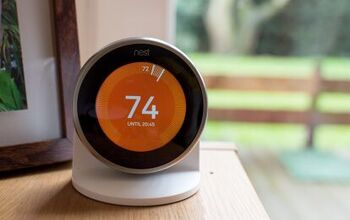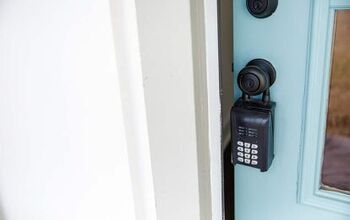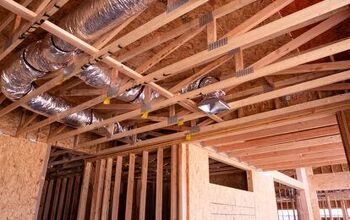Who Is Responsible For Pest Control On A Rental Property?

No matter who you are or where you live, nobody likes pests. Whether it’s bed bugs, termites, mice, or another pest, they’re a nuisance, and they keep you from living your best life. A hatred of pests applies to both homeowners and renters alike. If you live in a rental property infested with pests, it’s important to know whether it’s your responsibility or your landlord’s to get rid of the pests.
If you live in a rental property, it’s almost always the landlord’s responsibility to take care of pest control. This applies to houses, apartments, and multi-housing developments alike. The only time that the renter is responsible for pest control is in situations where you caused the problem or if your lease dictates that you’re responsible.
The division of responsibility between landlord and renter on a rental property is a subject of endless discussion. It’s not unusual for owners to sneak clauses into lease agreements stipulating that they aren’t liable for pest control. In nearly all situations, however, this responsibility often falls to the landlord or owner of the property rather than the person renting it.
Who is Responsible for Pest Control in Rentals?
While the landlord is often responsible for paying for pest control and hiring the company, pest control is a dual-responsibility situation. The tenant and landlord often have to work together to take care of infestations. There are also times when the landlord isn’t held liable for infestations if they can prove that it happened due to something the tenant did.
There are several loopholes and caveats to be aware of regarding whether responsibility falls to the landlord or the tenant. It sometimes also depends on the type of property that’s being rented.
Single-Family Units
In single-family buildings such as houses, the line is a little bit blurrier about who is in charge of taking care of pest control. In many situations, it still falls to the landlord to ensure that pests are dealt with. However, in certain cases, if the landlord can prove that the tenant is at fault for causing the infestation, the tenant is forced to take care of the pest control.
Regardless of who pays for it and who hires the pest control company, it’s up to the tenant to make sure their landlord is aware of the problem. Your landlord isn’t going to know that there are pests unless you notify them, and this responsibility always falls to the tenant.
Multiple Family Units
In multi-family units and apartment buildings, the landlord is responsible for taking care of pest control. It still falls to the tenant or tenants to notify them of the problem, but the landlord pays for the process and hires the pest control company.
Pest control is similar to any other problem in a rental property. For example, if the floors, walls, or ceilings in a rental need to be replaced or repaired, it will always fall to the property owner to make these changes rather than the renter. However, if damage directly results from something the tenant has done, they will have to pay for the repairs. The landlord will make sure that they happen, but they aren’t going to foot the bill for something that wasn’t their fault.
Who’s Responsible for Pest Control: Law by State
| State | Policy |
| Alabama | Landlords are responsible for pest control. |
| Alaska | Landlords are responsible for pest control. |
| Arizona | Landlords are responsible for pest control. They are also responsible for notifying the tenant of any known infestations. |
| Arkansas | Renters are often responsible for pest control in Arkansas. |
| California | Landlords are responsible for pest control. |
| Colorado | Landlords are responsible for pest control unless the tenant is responsible for the infestation. |
| Connecticut | Landlords are responsible for pest control. |
| Delaware | Landlords are responsible for pest control thanks to an implied warranty of habitability. |
| Florida | Landlords are responsible for pest control. |
| Georgia | There are no laws regarding pest control for rental properties in Georgia. |
| Hawaii | There are no laws regarding pest control for rental properties in Hawaii, but it typically falls to the landlord. |
| Idaho | Landlords are responsible for pest control. |
| Illinois | Landlords are responsible for pest control. |
| Indiana | Landlords are responsible for pest control. |
| Iowa | Landlords are responsible for pest control and vermin control. |
| Kansas | There are no clear laws dictating who is responsible for pest control on a rental property. |
| Kentucky | Landlords are responsible for pest control. |
| Maine | Landlords are responsible for pest control. |
| Maryland | Landlords are responsible for pest control. |
| Massachusetts | Landlords are responsible for pest control. |
| Michigan | Landlords are responsible for pest control. |
| Minnesota | Landlords are responsible for pest control. |
| Mississippi | Landlords are responsible for pest control. |
| Montana | Landlords are responsible for pest control. |
| Nebraska | Landlords are responsible for pest control. |
| Nevada | Landlords are responsible for pest control. |
| New Hampshire | Landlords are responsible for pest control. |
| New Jersey | Landlords are responsible for pest control. |
| New Mexica | Landlords are responsible for pest control. |
| New York | Landlords are responsible for pest control. |
| North Carolina | Landlords are responsible for pest control if the infestation is found within 60 days of inhabitation. However, after the 2-month mark, it’s up to the renter to take care of pest control. |
| North Dakota | Landlords are responsible for pest control. |
| Ohio | Landlords are responsible for pest control. |
| Oklahoma | Landlords are responsible for pest control. |
| Oregon | Landlords are responsible for rodent and vermin infestations, but not all pest control. |
| Pennsylvania | Landlords are responsible for pest control. |
| Rhode Island | Landlords are responsible for pest control unless the tenant causes it. |
| South Carolina | Landlords are responsible for pest control. |
| South Dakota | There are no clear laws regarding pest control on a rental property. |
| Tennessee | Landlords are responsible for pest control. |
| Texas | Landlords are responsible for pest control. |
| Utah | Landlords are responsible for pest control. |
| Vermont | Tenants and landlords share the responsibility for pest control. |
| Virginia | Landlords are responsible for pest control. |
| Washington | Landlords are responsible for pest control. |
| West Virginia | There are no specific laws about pest control on rental properties. |
| Wisconsin | Landlords are responsible for pest control. |
| Wyoming | There are no specific laws about pest control on rental properties. |
| Louisiana | There are no clear laws dictating who is responsible for pest control on a rental property. |
Regardless of what the law says in your state, it’s always best to check your lease for information about pest control.
What to Do When You Find Pests
As a tenant, you must take immediate action if you notice a pest infestation in your home. Here is a step-by-step process of what you should do to ensure the problem is resolved and that you aren’t stuck with the bill.
- Notify the landlord of the problem as soon as you discover it.
- Landlords aren’t required to double-check their appointment time with you, but ask them if they would be willing to do so.
- Check your lease to find out who will be responsible for footing the bill. In most cases, this responsibility falls to the landlord unless they prove that it was your fault.
- You should also check your state and local laws about who is responsible for pest control.
- Stay on top of your landlord to ensure they take care of the problem.
How Much Does Pest Control Cost?
The average cost of a pest control visit from a professional exterminator is $300 to $500. This depends on the extent of the pest infestation and the type of pests being exterminated. For example, if you need to have your entire house fumigated for termites, beetles, or bed bugs, your bill will be $3,000 to $8,000. For minor bee or ant problems, pest control costs between $50 and $120.
The Process of Pest Control
If you have discovered a pest infestation in your home, whether you’re a renter or an owner, the process is the same. To give you an idea of what to expect, let’s look at the sequence of events.
Hire a Pest Control Professional
The first thing you’ll do is hire a pest control professional or an exterminator. In most cases, both pros will be able to take care of your infestation. They will just go about it in different ways. Exterminators typically use harsher chemicals when eliminating pests, whereas pest control companies use less harmful chemicals but may take longer to get the job done.
In the cases of rental properties, it’s always the responsibility of the landlord to hire a pest control company. That is, of course, unless the lease stipulates otherwise. Who pays for the pest control will depend on where you live and the terms of your lease, but hiring typically falls to the landlord.
Seal the Property
After the proper professionals have been hired, they will proceed to seal off the affected areas of the property. If you’re looking at whole-house fumigation, the renters of the property will have to live somewhere else temporarily. If the problem is contained in a single room or area, there’s a chance that you can stay on the premises as long as you stay out of the infected area that’s being treated.
Conduct an Inspection Afterwards
After the pest controllers are finished with their work, it’s good for both the renter and the landlord to conduct an inspection. This way, both parties are aware of what the pest controllers did and whether or not it was effective. It also gives the tenant and landlord the chance to discuss what will happen if future infestations occur.
Tenant Responsibilities for Pest Control
Here is a list of the typical responsibilities of the tenant when it comes to pest control.
- Immediately report any evidence or suspicion of pests to your landlord or the property owner.
- Keep the property clean and free of food waste to avoid causing an infestation.
- Remove and store garbage bags and trash in exterior sealed containers
- If you think your pet has fleas, consider periodic preventative treatment as directed by your vet
- Report the presence of any external points where pests could infiltrate your home
- Be vigilant to not bring in pests from other locations where you have been
Landlord Responsibilities for Pest Control
Here is a list of the typical responsibilities that fall to the landlord.
- Apply pesticides or insecticides in and around the unit before tenants move into a home
- Comply with all habitability standards and building codes
- React to reports of pests as soon as you’re aware of them
- Inspect, identify, and repair any entry points into the home
- Communicate with tenants to determine the extent of the damage as well as to set up an appointment for the pest controller
- Hire a qualified expert to remove the pests
- Consider having your rental property treated for pests on a regular preventative basis.
How Does Your Lease Affect Pest Control?
Not all states have explicit laws or warranties of habitability about all types of pests. In most cases, it will come down to whatever your lease says about pest control. For larger properties and apartment buildings, you don’t always have a say about what your lease says regarding pest control. However, these properties are usually the ones that are protected by pest control laws.
The laws aren’t always as clear for single-family homes and duplexes or triplexes. You must make sure that pest control details are included in the lease when you sign it and that your landlord is responsible for any infestations.
Can I Break My Lease if My Landlord Doesn’t Offer Pest Control?
If your lease stipulates that your landlord is responsible for taking care of pest control, but they refuse to, you’re within your rights to break the lease. However, if the lease is unclear about who is responsible for pest control or stipulates that the tenant is responsible, it’s against the law for you to break your lease. Essentially, if your landlord is violating the terms of your lease, then you are no longer bound to it.
What are Tenant Pest Control Rights?
If you don’t want to jump straight to breaking your lease if a landlord doesn’t take care of pest control, you have several other options. Most states allow you to withhold rent from your landlord if they aren’t complying with the lease terms in regards to pest control. You can then decide to live with the problem and not pay rent or move into temporary housing. You can also move in with friends or family until your landlord lives up to his end of the agreement and takes care of pest control.

Before I started writing, I worked for 6 plus years in the plumbing, electrical, and HVAC business. I was primarily an HVAC installer but also worked as a plumber and electrician. Now I'm a copywriter, focusing on home improvement content and guides.
More by Jalin Coblentz



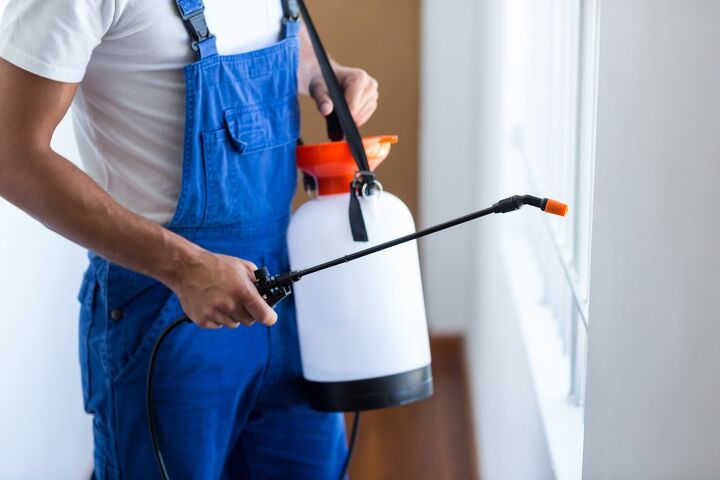






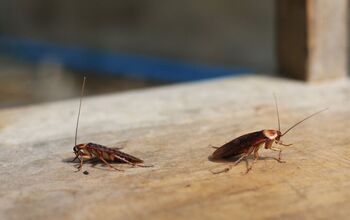



![10 Best Electric Pressure Washers – [2022 Reviews & Guide]](https://cdn-fastly.upgradedhome.com/media/2023/07/31/9070600/10-best-electric-pressure-washers-2022-reviews-guide.jpg?size=350x220)

![Standard Dining Room Table Dimensions [for 4, 6, 8, 10 and 12 People]](https://cdn-fastly.upgradedhome.com/media/2023/07/31/9074335/standard-dining-room-table-dimensions-for-4-6-8-10-and-12-people.jpg?size=350x220)
